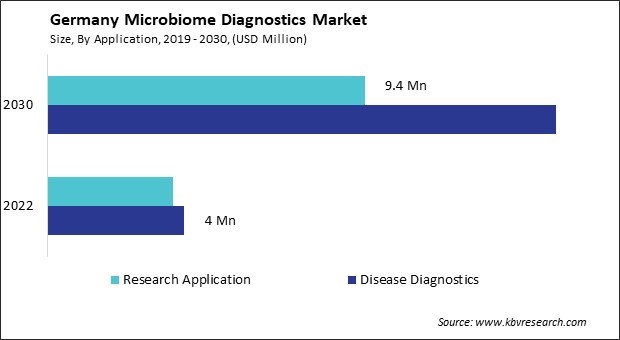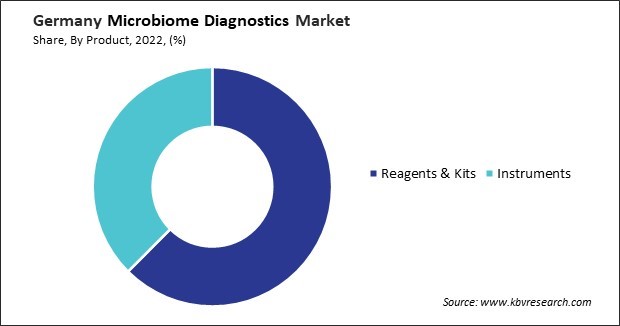The Germany Microbiome Diagnostics Market size is expected to reach $24.4 Million by 2030, rising at a market growth of 15.6% CAGR during the forecast period.
The microbiome diagnostics market in Germany has grown significantly in recent years. One of the key drivers of the microbiome diagnostics market in Germany is the rising prevalence of chronic diseases such as inflammatory bowel disease (IBD), obesity, diabetes, and cancer. Research has shown that alterations in the gut microbiome composition are associated with the development and progression of these conditions. Consequently, there is a growing demand for microbiome-based diagnostic tests that provide insights into the microbial imbalances associated with these diseases.

According to the National Library of Medicine, Germany faces a significant health challenge, with 53.5% of adults classified as overweight, with men disproportionately affected compared to women. The prevalence of obesity stood at 19.0% for both genders in 2020. As the nation strives for improved healthcare outcomes, the microbiome diagnostics market is poised to contribute significantly to the evolving landscape of preventive and personalized medicine.
Moreover, the increasing adoption of next-generation sequencing (NGS) technologies in Germany has revolutionized microbiome analysis by enabling high-throughput sequencing of microbial DNA. NGS-based techniques allow for comprehensive profiling of microbial communities, offering detailed information about microorganisms' abundance, diversity, and function. In Germany, the availability of advanced NGS platforms and bioinformatics tools has facilitated the development of innovative microbiome diagnostics assays with improved sensitivity and specificity.
However, the COVID-19 pandemic in early 2020 profoundly impacted the healthcare landscape worldwide, including the microbiome diagnostics market in Germany. The pandemic led to disruptions in healthcare services, diverted resources toward managing the crisis, and prompted changes in patient behavior and priorities. In response to the pandemic, many healthcare facilities in Germany had to adapt their operations to focus on COVID-19 testing, treatment, and vaccination efforts, which temporarily affected the adoption of non-urgent diagnostic tests, including microbiome analysis.
In Germany, a growing awareness of the significance of gut health has catalyzed remarkable advancements in microbiome diagnostics. The microbiome, comprising trillions of microorganisms residing in the gastrointestinal tract, is pivotal in maintaining overall health and well-being. This realization has spurred a burgeoning interest in understanding and assessing the composition and functionality of the gut microbiota, leading to the rapid expansion of the microbiome diagnostics market in Germany.
One of the primary drivers behind this heightened awareness is the increasing prevalence of gastrointestinal disorders and other health conditions linked to imbalances in the gut microbiome in Germany. Conditions such as irritable bowel syndrome (IBS), inflammatory bowel disease (IBD), and even systemic diseases like obesity and diabetes have been closely associated with alterations in gut microbial composition. As a result, both healthcare professionals and the general population are recognizing the crucial role that the gut microbiome plays in maintaining optimal health.
Additionally, the proactive shift towards preventive healthcare strategies has fueled the demand for microbiome diagnostics for early detection and risk assessment for various health conditions. Thus, the growing recognition of the gut microbiome's significance has propelled Germany into the forefront of microbiome diagnostics, driven by the need to address gastrointestinal disorders and embrace preventive healthcare approaches.
The microbiome diagnostics market in Germany is experiencing a significant surge in demand for direct-to-consumer (DTC) microbiome testing services. As Germans seek to take a proactive approach to managing their health, they are turning to microbiome testing to gain insight into the composition and function of their microbial communities. One of the key drivers behind the rising demand for DTC microbiome testing services is the increasing prevalence of chronic diseases and conditions linked to dysbiosis, an imbalance in the microbiome. By analyzing their microbiome composition, Germans identify potential imbalances early on and take steps to address them.
Another factor contributing to the popularity of DTC microbiome testing is the growing interest in personalized nutrition and lifestyle interventions in Germany. With a better understanding of their microbiome composition, Germans make more informed choices about diet, supplementation, and other lifestyle factors that influence their microbial communities. This personalized approach to health optimization aligns with the broader trend toward precision medicine and personalized healthcare.
In response to the increasing demand, many companies are entering Germany's DTC microbiome testing industry, offering services tailored to consumer needs. These include comprehensive microbiome analysis reports, personalized dietary recommendations, and ongoing support from healthcare professionals or certified nutritionists. Therefore, as Germans prioritize proactive health management, the surge in demand for DTC microbiome testing reflects a growing interest in personalized health solutions.

In Germany, the microbiome diagnostics market is witnessing rapid growth and innovation. Several companies are at the forefront of this burgeoning field, offering a wide range of microbiome diagnostics and therapeutics tailored to the needs of German consumers and healthcare professionals. One prominent player in the German microbiome diagnostics market is BioGaia AB, a Swedish biotechnology company specializing in probiotics and microbiome-based therapies. BioGaia's flagship product, BioGaia ProTectis, contains the patented Lactobacillus reuteri probiotic strain, which has been extensively studied for its beneficial effects on gut health and immune function.
Another key company in the German microbiome diagnostics market is Eurofins Scientific, a global leader in laboratory testing and scientific research services. Eurofins offers a comprehensive portfolio of microbiome analysis services, including metagenomics, metatranscriptomics, and metabolomics, to investigate the composition and function of microbial communities in different environments, such as the human gut, skin, and soil. With state-of-the-art facilities and expertise in bioinformatics, Eurofins supports academic research, pharmaceutical development, and clinical diagnostics in Germany and worldwide.
Meanwhile, Berlin-based BIOMES NGS GmbH specializes in direct-to-consumer microbiome testing kits, enabling individuals to explore their gut microbiome composition and receive personalized health recommendations based on their results. BIOMES' INTEST.pro test analyzes the diversity and abundance of gut bacteria using next-generation sequencing technology, providing insights into gut health, nutrient metabolism, and potential microbial imbalances. Through its user-friendly platform and scientific expertise, BIOMES empowers consumers in Germany to take proactive steps toward optimizing their microbiome and overall well-being.
Additionally, German biotechnology company Ambiate GmbH focuses on developing microbiome-based diagnostics and therapeutics for gastrointestinal diseases and metabolic disorders. The company's proprietary technology platform integrates microbiome analysis, artificial intelligence, and biomarker discovery to identify microbial signatures associated with specific health conditions and develop targeted interventions, including probiotics, prebiotics, and microbial consortia. By leveraging advanced bioinformatics and molecular biology techniques, ambiate aims to advance precision medicine and improve patient outcomes in Germany.
Furthermore, German startup BIOMESANTÉ GmbH specializes in microbiome analysis and bioinformatics solutions for healthcare providers and research institutions. BIOMESANTÉ offers microbiome profiling services, data interpretation tools, and consulting expertise to support clinical studies, drug development projects, and personalized medicine initiatives focused on the gut microbiome. Hence, the microbiome diagnostics market in Germany is characterized by a diverse ecosystem of companies leveraging cutting-edge technologies and scientific insights to unlock the potential of the microbiome for health and disease management.
By Application
By Product
By Sample
By Technology
By End User
Our team of dedicated experts can provide you with attractive expansion opportunities for your business.

